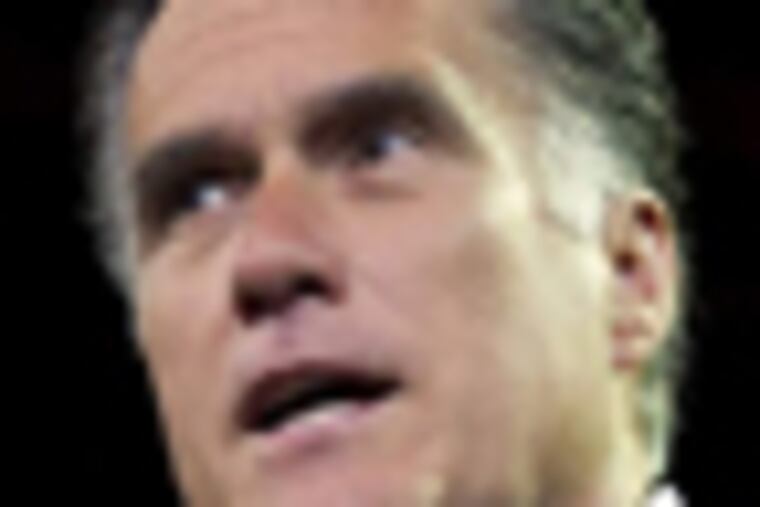Mitt Romney is still fighting the cold war
Foreign policy hasn't figured much in the presidential campaign, which is lucky for Mitt Romney. With scant foreign policy experience, Romney has had trouble projecting himself as a statesman. His foreign policy statements have veered from vague to disturbingly hawkish.

Foreign policy hasn't figured much in the presidential campaign, which is lucky for Mitt Romney.
With scant foreign policy experience, Romney has had trouble projecting himself as a statesman. His foreign policy statements have veered from vague to disturbingly hawkish.
So this week, he's off to Europe and Israel in hopes of burnishing his image as the future leader of the "free world." Unfortunately, the world Romney seeks to lead no longer exists.
Romney's foreign affairs statements have a Rip Van Winkle quality, as if he had just emerged from a sleep of two decades. His cold war language suits the bipolar world of the 20th century, not the current era.
One telling example: Earlier this year, he made the stunning claim that Russia was "our number-one geopolitical foe," prompting former Secretary of State Colin Powell to comment, "C'mon, Mitt, think. That isn't the case."
Romney's cold war mind-set prevents him from coming to grips with the major global problems he would have to deal with. In October, in a major foreign policy speech, he insisted: "This century must be an American century. In an American century, America leads the free world, and the free world leads the entire world."
I agree that American leadership still matters mightily on most global issues. But does Romney intend, as he has stated, to increase our military by 100,000 troops and raise defense spending — while cutting taxes? Has he read the newspapers for the last year?
Does he really think we still lead something called the "free world" against one nefarious enemy — I guess, in his view, Moscow?
Other powerhouse states are emerging, including, most obviously, China. Regional powers such as Turkey and Brazil are no longer constrained by the cold war and don't have to obey Washington. The security threats we face are no longer represented by one country or one "ism."
These are geopolitical facts, not some plot cooked up by President Obama. But Romney seems unwilling to face facts.
Nor does he confront the damage to America's global reputation caused by the debacle of the Iraq war. Perhaps that's because the list of Romney's foreign policy advisers is heavy on hawkish members of the George W. Bush team, including several who led the charge to invade Baghdad.
Though Romney never mentions George W., he's close to former vice president and uber-hawk Dick Cheney, who just threw him a big fund-raiser in Wyoming. Romney said last year that Cheney's "wisdom and judgment" would provide a model for choosing his own vice president.
Romney's homage to Cheney may be a ploy to convince right-wing Republicans of his conversion to conservatism. But his view of leadership does seem to channel Cheney with its heavy reliance on military and other threats.
On Afghanistan, Romney's policy position is mostly vague and hard to differentiate from Obama's. But he has said bluntly: "We should not negotiate with the Taliban. We should defeat the Taliban." Never mind that U.S. military commanders say the war cannot be won militarily.
I've been skeptical about the administration's efforts to talk with Taliban factions, but the effort must be made. Without a political settlement, the U.S. drawdown in Afghanistan will lead to civil war and chaos. Even former Bush national security adviser Stephen Hadley wrote an essay titled: "Enough Already: It's Time to Talk to the Taliban."
Waving his big stick, Romney doesn't explain how open hostility toward Russia jibes with the need for Moscow's help in moving military supplies into Afghanistan, and troops and equipment out.
A vital northern supply route runs through Russia and central Asia.
As for China, Romney seems eager to set up a confrontation with the Asian giant immediately upon taking office. He promises to declare China a currency manipulator as soon as he takes the oath.
And then there's Iran. Romney has said, "If I'm president, the Iranians will have no question but that I will be willing to take military action" to prevent Iran from getting a nuclear weapon. Eager to portray Obama as weak — despite the president's success in imposing crippling economic sanctions on Tehran — the Republican candidate is boxing himself in to military action. There are even rumors that Romney might give a high-ranking foreign policy post to the hard-line conservative John Bolton, the former U.S. ambassador to the United Nations, who is leading the charge for a U.S. attack on Iran.
Never mind that the U.S. military brass believes another Mideast war could unleash disaster, exacerbate the global economic crisis — and increase the chances that Iran will produce a nuclear weapon.
Romney's campaign stop in Israel may win votes from evangelicals, but it won't answer the key question about his foreign policy bona fides: Does he really believe the world is still frozen in the paradigm of a cold war that ended 20 years ago?